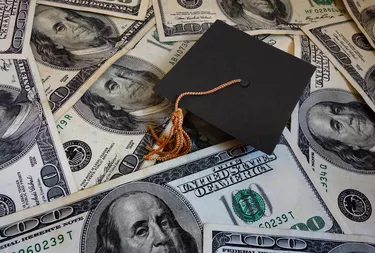
Many college students choose to continue with higher education after they finish their undergraduate degree or return to school to finish a degree after some time off. Are you wondering, "Can I get another loan if I already have one?" In most cases, you will be able to get new student loans even if you are still working on paying off student loans from your previous education.
Federal Student Loans
Video of the Day
Can anyone get a student loan? Not necessarily, but most people can. The federal government issues new loans to students who already have loans, assuming they meet a few basic guidelines. First, the borrower cannot currently be in default on one of the other federal student loans. As long as you are up-to-date on your payments as agreed with your other student loans, you meet this condition.
Video of the Day
Second, you cannot borrow beyond the maximum lifetime limits for the federal loans. For example, you cannot borrow more than $31,000 of Stafford loans for undergraduate education and no more than $138,500 in your lifetime. The Perkins loan program caps you at $27,500 as an undergraduate and a lifetime limit of $60,000.
Private Student Loans
Lenders for private student loans do not explicitly exclude borrowers who are in default on student loans from borrowing again. This could be an option for getting another student loan, if you are in need of one. However, given that they check your credit score before issuing a new loan, it could hurt your chance of approval.
If you apply with a co-signer who has excellent credit, the lender might be more likely to issue a new student loan because of the guarantee that the co-signer will repay it if you do not meet your commitment.
In-School Deferment
Lenders allow you to defer payments on your existing unpaid student loans while you return to school. Contact your lender to apply for deferment before you enter school again.
While you are enrolled, you are not required to make any principal and interest payments, although you can if you would like. Interest will continue to accrue on your loan balance while it is in deferment except on subsidized Stafford loans and Perkins loans.
Considerations for Loans
Before taking out additional loans, estimate your cost to repay them after you finish your schooling. The Federal Student Aid website has repayment calculators for the different repayment plans offered. Use them to calculate your potential monthly payment after graduation on all loans, including the unpaid ones from before and the new loans you are planning to get for your future education.
Consider whether your anticipated salary after graduation will be enough to support yourself and make loan payments. You should also look to see whether you can get any scholarships, which the federal government encourages as a way to limit the loans you have to take out.
Rehabbing Old Loans
If your loans are in default and you would like to return to school, you can try to rehab a loan. Start by calling your lender to see whether they have any programs to help you. From there, you can also look into loan rehabilitation programs available through the federal government.